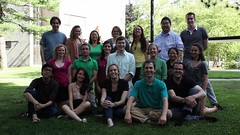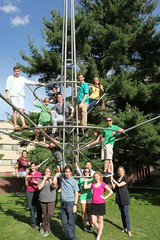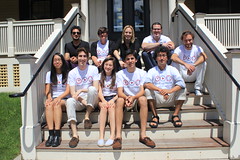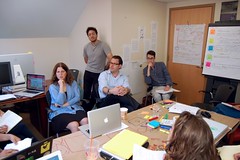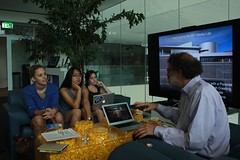37% of all teens ages 12-17 have smartphones, up from just 23% in 2011
One in four teens are “cell-mostly” internet users – they mostly go online using their phone
WASHINGTON (March 13, 2013) – Smartphone adoption among American teens has increased substantially and mobile access to the internet is pervasive. One in four teens are “cell-mostly” internet users, who say they mostly go online using their phone and not using some other device such as a desktop or laptop computer. These are among the new findings from a nationally representative Pew Research Center survey of 802 youth ages 12-17 and their parents that explored technology use. Key findings include:
- 78% of teens now have a cell phone, and almost half (47%) of them own smartphones. That translates into 37% of all teens who have smartphones, up from just 23% in 2011.
- 23% of teens have a tablet computer, a level comparable to the general adult population.
- 95% of teens use the internet.
- 93% of teens have a computer or have access to one at home. Seven in ten (71%) teens with home computer access say the laptop or desktop they use most often is one they share with other family members.
“The nature of teens’ internet use has transformed dramatically—from stationary connections tied to shared desktops in the home to always-on connections that move with them throughout the day,” said Mary Madden, Senior Researcher for the Pew Research Center’s Internet Project and co-author of the report. “In many ways, teens represent the leading edge of mobile connectivity, and the patterns of their technology use often signal future changes in the adult population.” Mobile access to the internet is common among American teens, and the cell phone has become an especially important access point for certain groups:
- 74% teens ages 12-17 say they access the internet on cell phones, tablets and other mobile devices at least occasionally.
- 25% of teens are “cell-mostly” internet users—far more than the 15% of adults who are cell-mostly. Among teen smartphone owners, half are cell-mostly.
- Older girls are especially likely to be cell-mostly internet users; 34% of teen girls ages 14-17 say that they mostly go online using their cell phone, compared with 24% of teen boys ages 14-17. This is notable since boys and girls are equally likely to be smartphone owners.
- Among older teen girls who are smartphone owners, 55% say they use the internet mostly from their phone.
“The shift to mobile internet use changes the ways teens access information and creates new challenges for parents who wish to monitor their children’s internet use,” said Amanda Lenhart, Senior Researcher and Director of Teens and Technology Initiatives for the Pew Research Center’s Internet Project. “Given bandwidth constraints and the fact that many websites are not yet optimized for mobile devices, teens who access content primarily on their cell phone may have to work harder to get important information. On the other hand, for parents who may wish to restrict access to their children’s exposure to certain kinds of content online, mobile devices can make it more difficult for parents to use the passive monitoring strategies they tell us they prefer, instead requiring more technical solutions.” The vast majority of those ages 12-17 are internet users. Still, the teens who live in lower-income and lower-education households are still somewhat less likely to use the internet in any capacity—mobile or wired. However, those who fall into lower socioeconomic groups are just as likely and in some cases more likely than those living in higher income and more highly-educated households to use their cell phone as a primary point of access.
- 89% of teens living in households earning less than $30,000 per year use the internet, compared with 99% of teens living in households earning $75,000 or more per year.
- 30% of teens living in households earning less than $30,000 per year are cell-mostly internet users, compared with just 14% of those in households earning $50,000-$74,999 per year and 24% of those living in households earning $75,000 or more per year.
The findings of the study are detailed in a new report called, “Teens and Technology 2013.” The report is the second in a series of reports issued by the Pew Research Center in collaboration with the Berkman Klein Center for Internet & Society at Harvard. The data are based on a nationally representative phone survey of 802 parents and their 802 teens ages 12-17, conducted between July 26 and September 30, 2012. Interviews were conducted in English and Spanish and on landline and cell phones. The margin of error for the full sample is ± 4.5 percentage points. Full report: http://www.pewinternet.org/Reports/2013/Teens-and-Tech.aspx About the Pew Research Center’s Internet & American Life Project The Pew Research Center’s Internet & American Life Project is one of seven projects that make up the Pew Research Center, a nonpartisan, nonprofit “fact tank” that provides information on the issues, attitudes and trends shaping America and the world. The Project produces reports exploring the impact of the Internet on families, communities, work and home, daily life, education, health care, and civic and political life. The Project aims to be an authoritative source on the evolution of the Internet through surveys that examine how Americans use the Internet and how their activities affect their lives. About the Berkman Klein Center for Internet & Society The Berkman Klein Center for Internet & Society at Harvard University is a research program founded to recognize, study, and engage the most difficult problems of the digital age and to share in their resolution in ways that advance the public interest. Founded in 1997, through a generous gift from Jack N. and Lillian R. Berkman, the Center is home to an ever-growing community of faculty, fellows, staff, and affiliates. Fundamental to its work is the study of the relationship between digital technologies and democratic values, including civic participation, access to knowledge, and the free flow of information. More information can be found at http://cyber.law.harvard.edu. Media contacts Mary Madden: mmadden@pewinternet.org and 202-419-4515 Amanda Lenhart: alenhart@pewinternet.org and 202-419-4514





